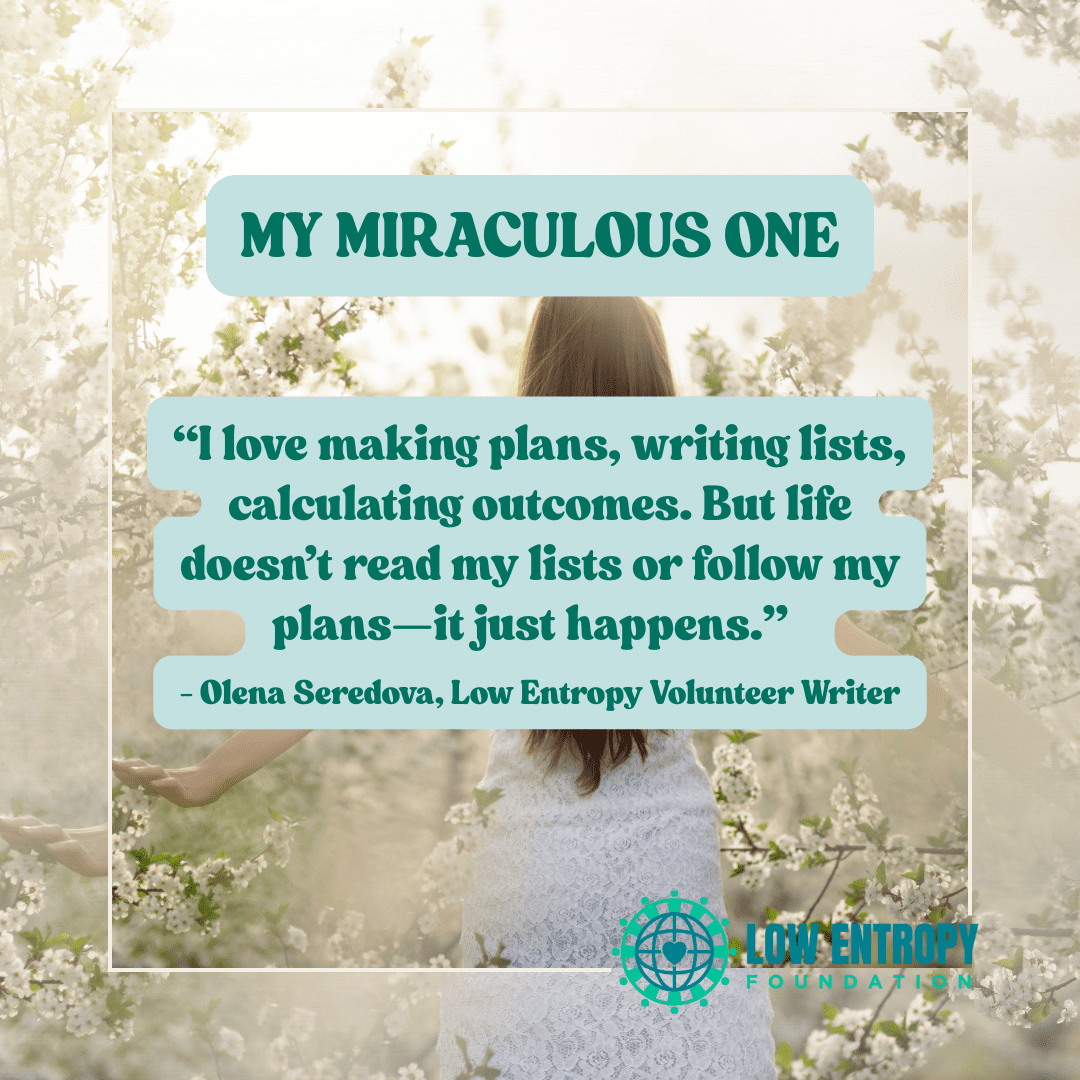Olena Seredova, Low Entropy Volunteer Writer
I had put off writing this letter for a long time. It didn’t feel urgent—I thought I had plenty of time. Then I sat down to work on this article and finally wrote a letter to the one who has been with me my whole life.
“My dear, my miraculous one! You have been with me from the very beginning, from my first breath. There is so much I need to tell you. Forgive me for never truly thanking you. Forgive me for only now saying—thank you, my incredible body . . .”
I cried as I filled six pages with memories. It was hard to stop. I thanked my body for the most important moments—like the birth of my daughter, for example. But there were also many ordinary things, like feeling joy and gratitude for how quickly my fingers could type, keeping up with my thoughts.
Such a letter—especially from me, who had always treated my body as a machine to be tested and pushed to its limits . . . how did this happen? Something changed during my work on this article, and I would like to share my observations and reflections with you.
I love making plans, writing lists, calculating outcomes. But life doesn’t read my lists or follow my plans—it just happens. And sometimes, it brings major changes: my health fails, plans fall apart, loved ones leave. And if I’m honest, when things don’t go according to plan, I feel betrayed, as if I’ve been deceived.
With these changes come grievances, along with bitterness, despair, anger, resentment and fear: “Why did this happen to me?!” But no one ever signed a contract with me guaranteeing that life would unfold exactly as I had imagined.
Lately, I’ve begun to see why embracing change has always felt so difficult for me.
It’s because of that famous mantra: “Me, mine, my own.” I must have practiced it too diligently. I got used to thinking that everything I have is mine by right—my youth, my health, my family, my friends, my talents. All of it undeniably, unquestionably mine. Seeing everything as mine, any change or loss felt unjust.
But let’s reflect—what do we really control, and what is truly ours? We didn’t choose our personality, homeland, parents, era, appearance or health. We didn’t choose the people we would meet, the abilities we would be given—we didn’t even choose our own name.
Control is even more elusive. If I truly have control, then why can’t I hold on to my youth? Why can’t I ensure my loved ones will always be safe? Why can’t I guarantee that happiness will last forever?
Maybe it’s wisdom that has finally come with time, or maybe I had to lose too much to understand it. And forgive me if this sounds like a cliché, but I must say it: “We are given these gifts, but they were never truly ours.”
We were simply allowed to use them—briefly, freely. We had no part in creating anything we consider our own. Perhaps it’s simpler to say that we received this entire world as a gift.
And here is what I have come to understand: gratitude is not just a polite phrase—it is a fundamental state of mind. People say that happy individuals don’t have more than unhappy ones. They just have a better-developed ability to notice what they already have.
In recent weeks, I immersed myself in this idea—do you know what gratitude has done to me? I no longer feel anger that my health is not what it once was. Instead, I thank my body for allowing me to do everything I’ve wanted for so many years. I no longer resent that people leave. Instead, I am grateful that I had the chance to meet them. I no longer fear the future. I understand: everything I need, I already have.
Here’s my surprising realization—grievances make me a victim of circumstances, while gratitude sets me free. And there’s something else I’ve come to understand.
After writing my letter to my body, I can’t quite explain it, but something shifted within me. In the way I walk, in my posture, even in how fast I eat. As if, after a deep conversation with a good friend, I now carry a quiet sense of fullness and support within me. Gratitude has led me to newfound respect for my body. But what is even more astonishing—it has given me respect for the world that manifests through my body.
It feels as though, through my now heightened senses, I am perceiving a world more vivid and extraordinary than before. For now, I am enjoying this childlike wonder, as if I had stepped into a celebration held in my honor. And this celebration wasn’t arranged by someone—it was arranged by the world itself.
Grievance and gratitude are opposites. The more we carry of one, the less space there is for the other. Gratitude shatters the illusion that the world owes us something and transforms life into a gift—one that we are eager to unwrap with curiosity and delight.
We live in a world full of invisible miracles. Gratitude is the ability to recognize our wealth before we lose it.
—
Leave your thoughts for Neha in the comments below. You can also follow us on Facebook, Instagram, TikTok, Twitter and YouTube to stay up-to-date with Low Entropy news!

